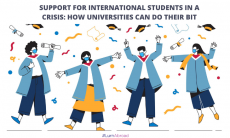UK’s international education landscape witnessed a massive shift at the start of the year as it left the Erasmus Programme. Although the failure of negotiations between the UK and EU was feared to have major repercussions for students aspiring to study abroad, the UK sprung into action quickly and came up with an alternative called the Turing Scheme. The scheme is dedicated to Alan Turing, a renowned mathematician and computer scientist. It aims to ensure that British students get a fair shot at international education, even without Erasmus being around. As a study abroad aspirant, here are the facts you must know about the Turing Scheme.
AN OVERVIEW OF THE TURING SCHEME
The £100 million international Turing Scheme is an international study and work programme to support students from the UK for completing a part of their studies at an international destination. The £100 million scheme will be operational from September 2021, and it will cover around 35,000 students with funding for overseas study and work placement programmes. It specifically aims to assist students from underprivileged backgrounds and underrepresented groups to bridge the socio-economic gaps. Further, it looks forward to empowering young students with soft and hard skills to make them employment-ready. The benefits will extend to both students and employers as they will have better opportunities coming up.
WHO IS ELIGIBLE
When it comes to eligibility for accessing funding under the Turing Scheme, schools, colleges, higher education institutions, and vocational training centres in the UK can apply. Once approved, any student attending these institutions, full or part-time, can seek the benefits of the scheme. However, funding depends on the country and the placement chosen by the student.
A COMPARISON WITH ERASMUS
The Turing Scheme comes ahead as a replacement of Erasmus, so a comparison between the two is befitting. According to the UK government, the Erasmus Scheme was not working in favour of British students and taxpayers. The number of Erasmus participants coming to the UK was twice the number of British students taking part in the scheme within the last five years. Additionally, the number of UK students studying or working outside of the EU under Erasmus was very small. The government considered that the annual £600 million contributions were not fetching worthy returns. Although the other benefits of the Turing Scheme may be comparable with the Erasmus program, it brings fairer value to the taxpayers in the country.
BENEFITS OF THE TURING SCHEME
Apart from being favourable for the UK taxpayers, the Turing Scheme opens a wide range of benefits for the students who participate in it. Here are the ways it can serve value.
- STUDY AT THE BEST SCHOOLS: With Turing, students will be able to attend world-leading institutions as they fulfil their study abroad dreams. These include impressive names such as Harvard, Yale, the Massachusetts Institute of Technology (MIT), and the University of Toronto. Right now, students from the UK are not getting enough of the chance because some of the schools pick fewer than a hundred students from the country every year. The Turing Scheme will bring more choices at destinations beyond the EU
- EXTRACURRICULAR ADVANTAGES: Apart from enhancing education and work placement opportunities, the Turing Scheme also emphasises extra-curricular areas. Students step out of their comfort zone, experience new cultures, and learn life skills such as independence, resilience, and adaptability. Additional language skills and rich international study experience strengthen their CVs and open them to better career prospects in the future.
- GLOBAL CITIZENSHIP: Limited interactions with other parts of the world have deprived young Britons of the opportunity to explore different cultures and build qualities such as empathy, tolerance. The Turing Scheme is all set to nurture global citizens with a truly transnational outlook.
- OUTREACH AND RELATIONSHIPS: With the Turing Scheme, the UK shifts focus from the EU and aims to extend its outreach on a broader scale. There are good chances that British students and universities will build stronger relationships with countries such as Japan, where the exchange programmes were limited when it was a part of Erasmus. Other names on the list include India, Saudi Arabia, Indonesia, and Nigeria.
Even as the Turing Scheme sounds like an excellent alternative to Erasmus, it is too early to predict its viability. While Erasmus covers tuition fees and provides funds for living expenses, the Turing Scheme is yet to clear its stance on these aspects. Further, the current global pandemic situation is another concern for the programme that involves lots of international travel to different parts of the world. Even as there is still a lot to know about the Turing Scheme, it shows great promise for the British students who aspire to pursue study abroad dreams ahead.

If you are considering studying abroad why don’t you discuss your prospects and opportunities with experts at Lurnable’s dedicated study abroad counselling division LurnPathways?












